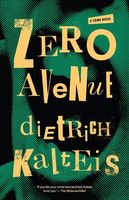Yogurt and vodka for breakfast! It must be punk noir!
By Lisa de Nikolits
Today we are chatting with Dietrich Kalteis, award winning author of House of Blazes, Triggerfish, The Deadbeat Club, Ride the Lightning and most recently, Zero Avenue, all published by ECW, Toronto publisher of “the most exciting, controversial, and insightful takes on the hottest subject matter.”
Lisa: And the early punk scene in Vancouver was nothing if not hot! Welcome, Dietrich, and thank you for taking the time to chat to us about Zero Avenue, which I am categorizing in this series, 16 Shades of Noir, as punk noir which is also a kind of classic noir – for reasons which will become apparent!
Dietrich: Thanks for inviting me to chat, Lisa.
Lisa: Frankie del Rey’s not your usual hardboiled protagonist but she certainly packs a punch (or in her case a pink toy gun filled with pepper spray!). What characteristics, if any, does 24 year-old punk rocker Frankie share with the hardboiled heroine of the 1920-1950’s noir?
Dietrich: When I think of the characters from those hardboiled classics by Hammett, Cain and Chandler, I think of tough guys driven by a strong sense of right and wrong. The women often showed up in the role of femme fatale. Later on authors like Sue Grafton and Sara Paretsky took a contemporary spin on the hardboiled characters and introduced us to heroines who were courageous and skilled in dealing with whatever they faced, and Frankie del Rey shares some of that. Above all she has her music, and she’s good at it and won’t let anything get in the way of what she wants. Behind her tough exterior, she does share that sense of right and wrong with the classic characters, although Frankie’s senses may be a little distorted, just like her music. I think of her as part unwitting heroine, part femme fatale and part voice of reason, but definitely not somebody you want to mess with — with or without the pink pepper-spray gun.
Lisa: Frankie’s told that she is “Five years past L.A.” That’s such a great line! Can you talk a bit about that line since it’s so pivotal to Frankie’s character.
Dietrich: Marty Sayles is the drug lord she mules dope for, and he throws the line at Frankie to get under her skin and to keep her under his thumb. It’s his way of telling her she’ll never make it in the music industry, and she ought to be grateful he keeps her around. And it’s just the start of what fuels Frankie to even the score with him.
Lisa: I read that you listened to punk rock for nine months while you wrote this book. Can you tell us and give us some examples of what was on your playlist?
Dietrich: I always listen to music while I write, and I play what goes with what I’m working on. For Zero Avenue I got my hands on as much of the early Vancouver punk sound as I could find: D.O.A, the Subhumans, Pointed Sticks, the Dishrags, Payolas, Braineaters, Young Canadians, the Modernettes, the Reactors. I also put some early Toronto bands on my playlists, bands like the Viletones, the Demics, the Diodes, the Cardboard Brains, the Mods, and the Ugly; and also Teenage Head and the Forgotten Rebels from Hamilton. I rounded it out with bands from the U.S. like the Ramones and the Stooges. And there were the Clash and the Sex Pistols from the U.K., and lots more.
Lisa: Elmore Leonard once said, “I’ve always seen my books as movies.” Do you feel the same about your books?
Your CanLit News
Subscribe to Open Book’s newsletter to get local book events, literary content, writing tips, and more in your inbox
Dietrich: I visualize my chapters like movie scenes as I write them. It’s how everything comes to life in my head. I tend to keep the chapters short and descriptions sparse, giving just enough detail for the reader to imagine what’s there so the pace can keep moving. I start with an idea for a single scene, drop in the kind of characters I’d like to see handle the situation and let it go from there. By the time I finish the one scene, an idea for the next one usually shows up. Once I’ve got a completed first draft, I go back and take out anything that’s not working, adding in better bits as they come to me — a real ‘seat of the pants’ approach, but yes, I do picture what I’m writing like movie scenes.
Lisa: You’ve said: “Elmore Leonard was definitely the master of showing us what a lowlife was all about, revealing much of a character with just dialog.” Zero Avenue’s dialogue crackles and snaps, setting the pace, the sense of character and place. Was this easy to achieve or did it flow naturally?
Dietrich: To get it right, the characters’ words have to sound unique and natural, like they just flowed out. As the characters develop through the early stages, I keep my own principles and values out of it and let them speak and be themselves. When it feels like I’m just typing their words, then I know I’ve got it right. And I like to let dialog do the heavy lifting. I love the scheming and the characters’ exchange of words, particularly when they say one thing and mean another, which sometimes reveals more about them than their actual words. And no matter how wrong or devious, I love when they show that sense of righteousness, that ‘they had it coming’ attitude.
Lisa: Tell us about your research into the Vancouver punk scene - what was the most unusual/unexpected piece of information you found?
Dietrich: Listening to the music and talking to people who remembered the times helped a lot with the vibe. And there are some great books on the subject that filled in a lot of the details: Guilty of Everything by John Armstrong, Perfect Youth by Sam Sutherland, I, Shithead and Talk-Action=Zero, both by Joe Keithley helped relive those times. And there was Bloodied but Unbowed, an awesome documentary by Susanne Tabata. It’s jam-packed with clips, music and tales from that first wave of Vancouver’s punk scene.
What I liked about the scene was its edge and the ‘us against them’ outlook, how that indie ‘shake it up’ attitude threw a middle finger to the status quo. It made a sharp contrast to what some considered a sleepy backwater town at the time. For me, it made the perfect setting for a crime novel.
There were so many interesting bits of research that turned up, from the self-published fanzines like Snotrag that kept a finger on the punk subculture, to the DIY recordings and local record labels that sprang up. One thing that was unexpected was how the local scene seemed to line more with what was happening down the coast (San Francisco and L.A.) than it did with what was happening in the punk scene in other parts of this country.
Lisa: Danone yogurt and vodka for breakfast - most important meal of the day! Where did the idea come from?
Dietrich: We’ve all heard that bit of wisdom since we were kids, how breakfast is the most important meal, so it just fit with yogurt being healthy and the perfect breakfast fare, while vodka’s … well, it’s vodka. It’s Frankie’s aunt Rita who puts her own spin on the breakfast convention. The idea was to show rather than tell that Rita is forward thinking, is her own gal and has a bit of a rebel soul too. And it also shows she’s somewhat disenchanted with aspects of her own life, hence the vodka.
Lisa: Zero Avenue feels (to me) like a book you wanted to write for a long time? Was it an idea that bounced around in your head a while?
Dietrich: I was drawn to elements of the story and identified with the rebel characters and that ‘shake it up’ attitude. And I knew people growing up who were like some of the ones in the book, right down to a couple of guys who went to rob a pot field and had rock salt shot at them. So yeah, I guess parts of the story may have been bouncing around in my head for a while.
Lisa: You’ve said: “I’m drawn to stories that hold some kind of humor, and I like when there’s some payback and a sense of setting something right. Maybe what inspires me today might change tomorrow.” So, now that Zero Avenue is complete, what’s next? Perhaps some neon-noir of the eighties?
Dietrich: Levity and the tension in a crime story create an interesting balance. While there’s nothing funny in the crimes themselves, sometimes it’s the characters’ cleverness or the lack of it, and sometimes it’s their desperation that lead to moments of dark humor.
And you were close, Lisa, my next one is Poughkeepsie Shuffle which is due out next year. It takes place in the mid-eighties and centers, not so much on neon-noir but on a guy named Jeff Nichols. Fresh out of the Don Jail, he gets mixed up in a smuggling ring operating from a used car lot in Toronto’s Junction. The outfit brings guns in from upstate New York, and Jeff’s a guy who’s willing to bend the rules to get on the fast track to riches, a guy who doesn’t let the lessons from past mistakes get in the way of a good score in the future.
Lisa: Thank you for joining us today, Dietrich!
The views expressed in the Writer-in-Residence blogs are those held by the authors and do not necessarily reflect the views of Open Book.
Originally from South Africa, Lisa de Nikolits has been a Canadian citizen since 2003. She has a Bachelor of Arts in English Literature and Philosophy and has lived in the U.S.A., Australia, and Britain. She is the author of seven acclaimed novels, including her most recent novel, No Fury Like That (Inanna Publications). She has won the IPPY Gold Medal for Women's Issues Fiction and was long-listed for the ReLit Award. Lisa has a short story in Postscripts To Darkness (2015), a short story in the anthology Thirteen O'Clock by the Mesdames of Mayhem, and flash fiction and a short story in the debut issue of Maud.Lin House.




